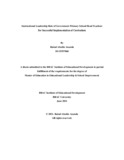| dc.contributor.advisor | Saha, Somnath | |
| dc.contributor.author | Ananda, Raisul Abedin | |
| dc.date.accessioned | 2021-10-06T06:50:22Z | |
| dc.date.available | 2021-10-06T06:50:22Z | |
| dc.date.copyright | 2021 | |
| dc.date.issued | 2021-06 | |
| dc.identifier.other | ID 19357060 | |
| dc.identifier.uri | http://hdl.handle.net/10361/15152 | |
| dc.description | This thesis is submitted in partial fulfilment of the requirements for the degree of Masters of Science in Early Child Development, 2021. | en_US |
| dc.description | Cataloged from PDF version of thesis. | |
| dc.description | Includes bibliographical references (pages 47-61). | |
| dc.description.abstract | The objective of this research was to study the perceptions of Government Primary School Head Teachers about their instructional leadership at school, which was broken down into specific themes and subthemes under the categories of instructional leadership dimensions. This research can be significant to the Government Primary School Head Teachers who practice instructional leadership to develop their leadership qualities and skills. A qualitative approach was taken for the study. Data collection was done through one-to-one interviews, and the thematic analysis method was used to analyze the findings. The findings found that Government Primary School Head Teachers feel the importance of all instructional leadership dimensions. They highly prioritize strong collaboration with relevant stakeholders towards s achieving a collective goal. Head Teachers stated that they maintain shared decision-making and responsibilities while coordinating with assistant teachers and encourage professional development. Besides ensuring a safe environment, they regularly monitor students' progress and supervise teachers' performance. While implementing instructional leadership, Head Teachers receive support from assistant teachers for different school-related works, School Management Committee (SMC) for resources, and Education Officers for training. However, they also face challenges, such as lack of accountability or integrity of the assistant teachers, low educational quality, or corrupted SMC members. Head Teachers usually take situation-based strategies to address the challenges. Finally, it was recommended Head Teachers should maintain a weekly tracking system, analyze assistant teachers' job satisfaction, cooperate more with URC instructors, establish a student behavior tracker at school, and involve Parents Teacher Association more in school improvement activities. | en_US |
| dc.description.statementofresponsibility | Raisul Abedin Ananda | |
| dc.format.extent | 63 pages | |
| dc.language.iso | en | en_US |
| dc.publisher | Brac University | en_US |
| dc.rights | BRAC University thesis reports are protected by copyright. They may be viewed from this source for any purpose, but reproduction or distribution in any format is prohibited without written permission. | |
| dc.subject | Instructional leadership | en_US |
| dc.subject | Curriculum | en_US |
| dc.subject | Successful implementation | en_US |
| dc.subject | Head teacher's perspective | en_US |
| dc.subject | Government Primary School | en_US |
| dc.subject.lcsh | Education, Urban -- Government policy. | |
| dc.subject.lcsh | School management and organization. | |
| dc.subject.lcsh | Educational leadership. | |
| dc.title | Instructional leadership role of government primary school head teachers for successful implementation of curriculum | en_US |
| dc.type | Thesis | en_US |
| dc.contributor.department | Institute of Education Development, BRAC University | |
| dc.description.degree | M. Early Child Development | |

